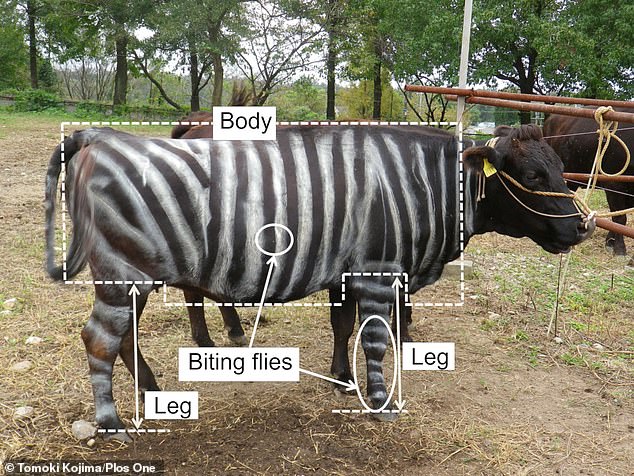One study confirms once again that simply painting white stripes on cows reduces fly attacks, which researchers see as an environmentally friendly alternative to pesticides.
Work published a few months ago revealed that the zebra stripes’ main objective was to repel parasites. In particular flies sucking blood. These patterns seem to disrupt the visual system of insects. As a result, as they approach, the flies do not brake enough to land. They hit the zebra and leave.
During this study, the researchers also did the test with horses. Tunics had been placed on their backs. Some were of single color (black or white), and others were zebra. And again, when horses wore striped coats, the number of flies that successfully landed had been lower than on other horses.
Same thing in cows
For this new study, researchers focused on cattle. More precisely on six Japanese black cows. Two of these cows were covered with stripes painted with white lacquer (which was easy to leave afterwards). Two others were covered with black stripes and two kept their natural coat.
The process was repeated for nine days, and all the cows alternated. In other words, all spent three days with white stripes, three days with black, and three days without scratches.
During each of these experiments, the researchers then calculated the number of flies that came to annoy the cows. Only an average of 55 flies were observed on zebra cows, compared with 111 on black cows and 128 on control cows.
Those that had been covered with white stripes also exhibited less avoidance behavior. About forty every 30 minutes, against against 53 and 54 for others.
This study confirms that the simple act of painting white stripes on cows can reduce fly attacks. Like zebras and horses.
An alternative to pesticides
Remember that flies are a real ordeal for cows. They prevent cattle from grazing, feeding and sleeping. Animals are stressed, and sometimes they get hurt. The economic impact of biting flies on livestock production in the United States is estimated at $ 2.2 billion a year, the researchers note.
To overcome this, farmers use pesticides. But more and more studies highlight the dangerousness of these products. Ultimately, it will be necessary to find more efficient and ecological alternatives. Like turning cows into zebras. The researchers believe in this, although other research will obviously be necessary before democratizing this practice.




